Forum
Emir Kusturica Workshop & Masterclass Opens—Self-recognition amid Tide of the Times and Social Changes
Video mash-up of films by Emir Kusturica
The Emir Kusturica Workshop & Masterclass of the 14th Beijing International Film Festival (BJIFF) opened on the afternoon of April 25. At the event, Emir Kusturica, Serbian director, screenwriter and actor, served as the keynote speaker to discuss with director Huang Jianxin and writer Yu Hua, while Li Mingtao, professor of the Central Academy of Drama, served as the moderator.
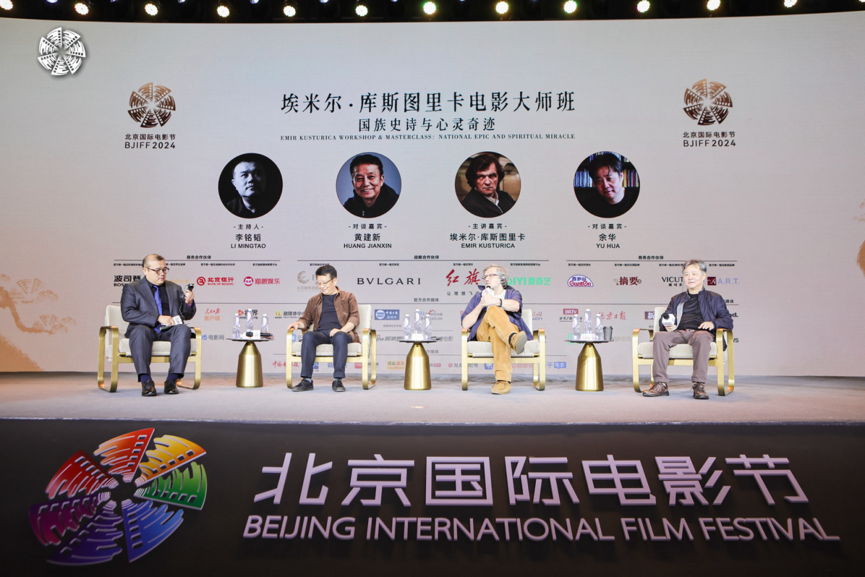
Site of Emir Kusturica Workshop & Masterclass
With brilliant achievements, such as the winner of major awards at the Festival de Cannes, Venice International Film Festival and Berlin International Film Festival, and a two-time winner of the Golden Palms, director Emir Kusturica has established him as an insurmountable mountain in the history of world cinema. His works, always featuring absurd narrative techniques and expressions, present grand themes like country and nation, and convey deep patriotism.
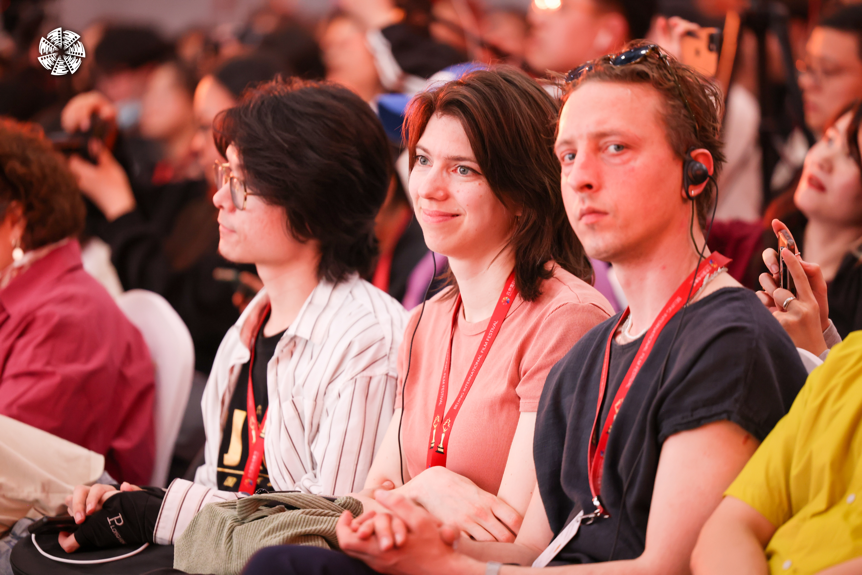
Site of Emir Kusturica Workshop & Masterclass
Under the theme of “Epic National History and Spiritual Miracle”, director Emir Kusturica shared with two panelists the process of his film creation in over four decades, and how he achieved self-recognition amid the tide of the times and social changes.
▌Filmmaking originates from the understanding of life
The growth environment and experiences at a young age have provided rich creative materials for Kusturica. When recalling his childhood, the director shared with the audience his experiences, “I grew up in a relatively happy family, but people around me had complicated family relations -- living in a single-parent family or an impoverished family. In my memory, I was seeking such a sense of survival and power. I wish to observe people on streets, see their development, and witness their changes in the society.”
Kusturica believed that as an artist, the ability of distinguishing what is “important” and what is “not important” is the first step before entering the art world. Just as he said, “We see the reality, split the reality, separate some elements or content from someone else’s stories, and blend them in films. My brain can tell from what is important and what is not, which is the first step for us to enter the art world.
Regarding wild imagination in Emir Kusturica’s works, writer Yu Hua praised, “Kusturica has two souls in my mind, one being the soul of Shakespeare and the other the soul of Chekhov. Sometimes the two souls are parted. For example, in the film When Father Was Away on Business, the soul of Chekhov is beating, but in the film of Underground, the soul of Shakespeare is beating, which is indulgent, open, free and unconstrained, all displayed in the film. However, in the film Time of the Gypsies, it seems that the two souls are united.”
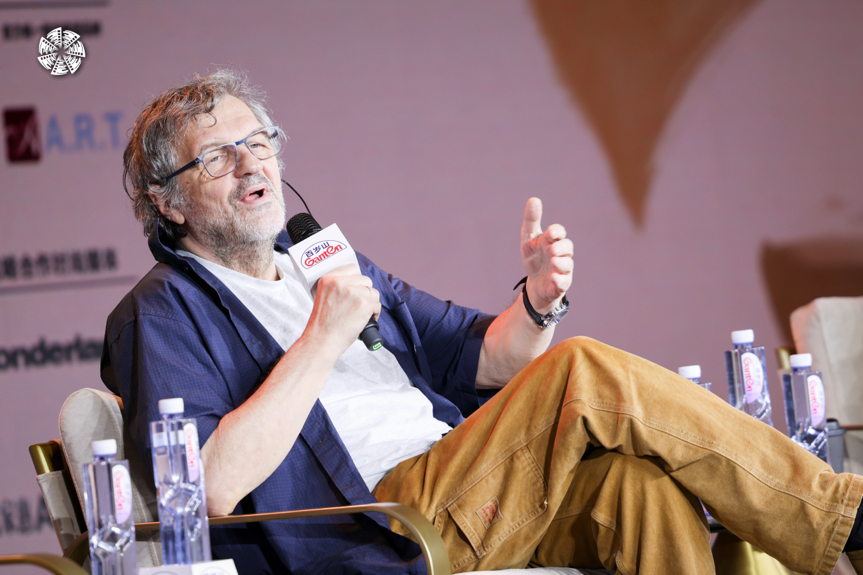
Emir Kusturica
For director Huang Jianxin, the selection of movie subjects and stories is also closely associated with life experiences. “When I started to shoot films, I paid special attention to ordinary people and subtle things accompanying my growth,” he said. “Later on, I began to shoot more realistic films, and recorded the changes of national development, based on which I created three films, Stand Straight, Don't Bend Over, Back to Back, Face to Face and Signal Left, Turn Right. A scene in Signal Left, Turn Right is the courtyard where I grew up.”
In the meantime, writer Yu Hua recalled that his acquaintance with Kusturica is also a detail of life about the film Underground. At that time, when he met Kusturica for the first time, the directed invited Yu Hua to visit the place where the creative inspiration of the film came from, which is an old and ruin-like door, quietly standing beneath the light. Behind this little door that is rarely noticed by passers-by is the dreamlike and profound cinematic world of Underground. When thinking about it, Yu Hua talked to Kusturica, “Our creation, inspiration and everything in our stories may originate from a door, and we will find out that there is such a wider world after we walk through it.”
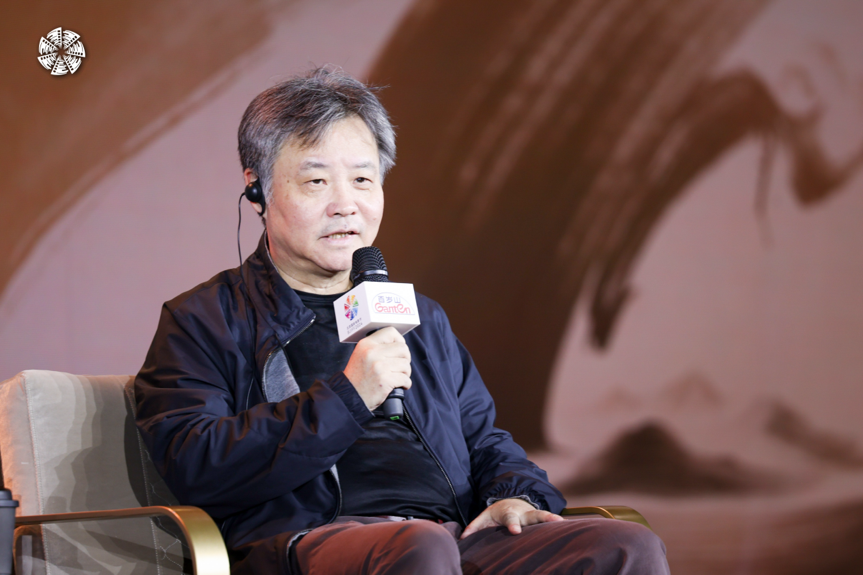
Yu Hua
▌Imprints of the times and society go deep into souls
As the products of filmmakers’ creative labor, films definitely have distinct characteristics of directors, who are the main body of creation. Besides, directors often live in a certain historical era and social environment, so imprints of the times and society will go deep into their souls.
Speaking of his home country Serbia, Kusturica said, “For me, I underwent such a period, and I didn’t ease the pain in my heart caused by my historical background until the end of the last century. I could hear the psychological trauma due to long-term social instability from the heart of every person. At the same time, they still conveyed a sense of humor in which they found joy amid hardship. This made me rethink whether other elements could be reflected in my films. I hope that my films can display such a great background of the times, and express my personal feelings of home and country with this demonstration.”
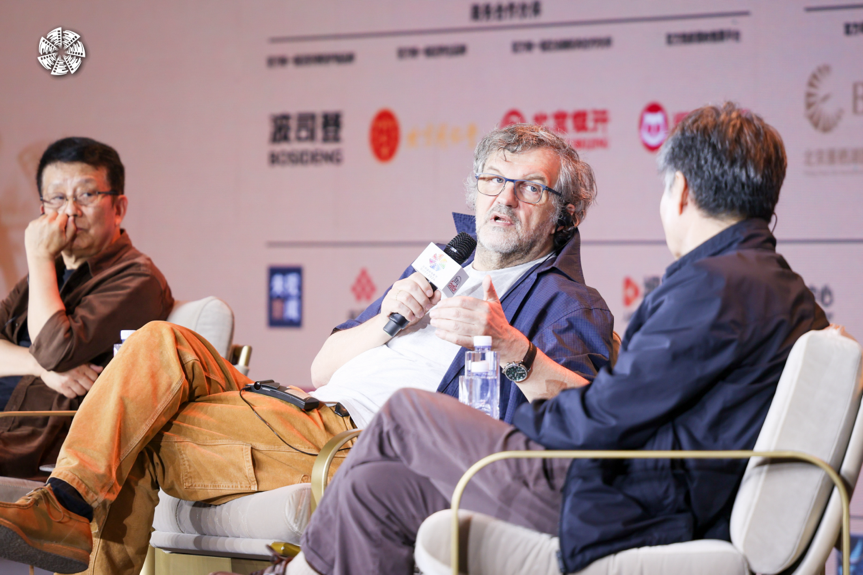
Site of Emir Kusturica Workshop & Masterclass
Such impacts and imprints are not only shown in Kusturica's works, but also reflected in details of his daily life. At the event, the director shared with the audience the reason for not tying his shoelaces, “You may have noticed that my shoelaces aren't tied, but why? I’d like to tell you that I have a peaceful mind now, but in the past on the streets of our country, we may be threatened, or conflicts may break out, so we must tighten our shoelaces and get ready to run anytime. Now I unlace my shoes and sit here in a relaxed gesture because I’m peaceful.”
When asked about the impact of the changing times on him, director Huang Jianxin replied, “The decision to shoot films may originate from the impact of a historical experience on individuals, and those historical imprints remained in my heart very deeply. Everything you undergo will surely leave deep marks on you. When you sincerely reflect it with emotions, your imagination and way of expression will naturally take shape. Therefore, a director should tell a story and create those characters in it with as much imagination as he/she can display, which can be both difficult and easy.”
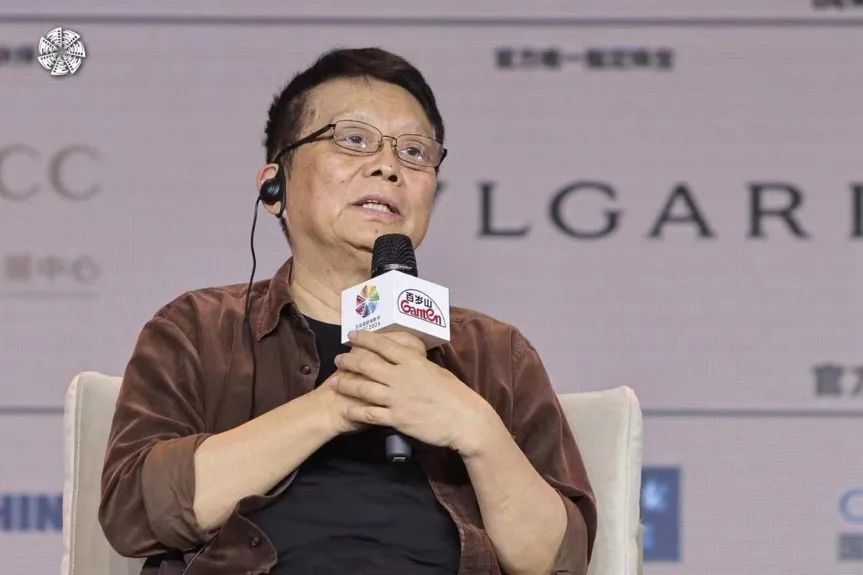
Huang Jianxin
Writer Yu Hua couldn’t agree more, as his works are always filled with the suffering consciousness. Such consciousness is closely linked to Yu Hua's personal experiences, and also comes from the imprints of the times and society on his heart.
▌Looking back on the past to achieve self-recognition
The tide of the times and social changes have laid a key tone of Kusturica’s works to some extent, which are seemingly noisy, but in fact deeply sorrowful, and also endowed his works with rich historical and epic connotations. However, as the footsteps of time always move forward, what we can do is to look back on the past and recognize ourselves based on the present.
His autobiographical memoir Où suis-je dans cette histoire?, which combines the director's experiences with the history of his motherland, tells the story of his legendary life growing from a child living in Sarajevo to a world-renowned director. The complex mood of protagonists after leaving their hometowns in films When Father Was Away on Business, Time of the Gypsies and Arizona Dream, and the theme of “Who do you belong to, my child?” in the last chapter of Où suis-je dans cette histoire? are exactly a reflection of the director's sense of loss and confusion that he does not know where to belong.

Site of Emir Kusturica Workshop & Masterclass
At the end of the workshop & masterclass, Li Mingtao invited director Emir Kusturica to share his feelings themed “Where I Belong in History”.
“As we all know that the sun rises in the east and sets in the other corner of the world, the extension of our cultures unfolds slowly in the same way. We hope to portray the changes of the times and nation through lens. I see that the future is bright and full of changes, but we can still imagine what the future looks like. I firmly believe that no matter what kind of person we are or what path we choose, we should look back on the past based on the present. It will change and inspire us so that we know where we come from and where to go. If you ask me where I am in history now, I think I am in the tide of the times, and come from where I belong. I am undergoing social, cultural and historical development, and living in an age that I believe in.”
--Emir Kusturica
April 25, 2024, Beijing
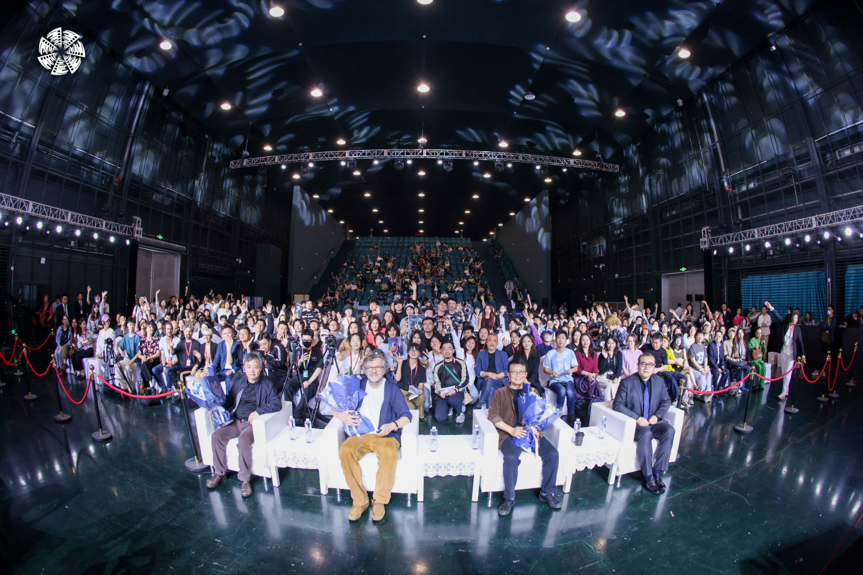
Site of Emir Kusturica Workshop & Masterclass
Please download the Beijing International Film Festival APP for more interesting content

